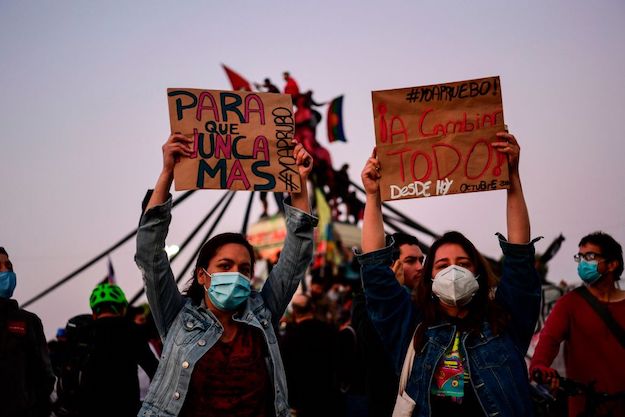An overwhelming victory for the Approve campaign has put Chile on a two-year path to a new constitution. But with presidential and legislative elections coming in November 2021, the government of Sebastián Piñera is in no position to lead the constitution-writing process and discredited political parties seem more concerned with winning votes of their own. The process urgently needs leaders to steer it to a successful conclusion – where will they come from?
Chileans have high expectations that a new constitution will bring about better pensions and other social services. Since public unrest and riots in October 2019 sparked the constitution process to begin with, many are eager to see quick improvements in their quality of life.
But while the writing of a new constitution always creates uncertainty, the conditions agreed upon by Chile’s elites for the next two years will add stress to the political system. The displays of hope and enthusiasm observed in Chile after the results of the constitution referendum were announced on Oct. 25 might quickly turn into disappointment and despair if people do not see improvements in the provision of social rights. Here’s what to look for as the process unfolds.
What to make of low participation
There was little doubt that the Approve vote would win, but the margin of victory was nonetheless surprisingly large. There were several reasons for Chileans to vote Approve. Some simply wanted to exorcise the memory of the father of the 1980 constitution, the former dictator Augusto Pinochet. Others see a new constitution as a magic pill that will solve all of Chile’s problems – including inequality and deficient public health and private pension systems.
Since popular support for a new constitution was strong, all of the centrist and left-wing opposition parties, as well as half of those from the center-right ruling coalition, came out in support of the new constitution. Several of Piñera’s cabinet ministers also openly campaigned for the Approve vote. Only the two most extreme right-wing parties campaigned for the Reject option.
Turnout, however, reached only 50.9% – slightly higher than in the 2017 presidential election. Though disappointing given the stakes involved, the fact that Approve was widely expected to win the vote – and that the country is still dealing with the pandemic – means low turnout should not delegitimize the process. Turnout went up by as much as 10% in several low-income municipalities in the capital Santiago compared to 2017. The participation rate declined a bit in upper-income areas, where there was overwhelming support for the Reject option, as well as in some other parts of the country. Overall, the enthusiasm observed among those who voted to retire Pinochet’s constitution was not sufficient to significantly boost participation rates, defying the predictions for record-breaking participation made by many polls in the weeks ahead of the vote.
Obstacles ahead
The institutional design for the constitutional process has many potential pitfalls. The first is in the election of members to the constitutional convention, which will take place on April 11, 2021. The 155-member convention will be elected using the same electoral rules as those for the Chamber of Deputies, with an open-list proportional representation system. A gender quota provision will be applied to make sure 50% of the members of the assembly are women. That might mean that some candidates (men or women) with larger individual vote shares will be replaced by candidates with fewer votes, though from the same parties, to guarantee gender parity.
Though the parties have pledged to promote the participation of representatives from civil society, the electoral system will induce the formation of multi-party coalitions. As a result, the assembly will be comprised mostly of career or aspiring politicians with enough clout to be nominated by political parties, or by people with strong name recognition – athletes, artists, television personalities and other well-known individuals with little constitution-writing skills or training. Since the election for the constitutional assembly will happen on the same day as elections for regional governors, mayors and council members, voters will have a long list of names to choose from, making it difficult for them to get to know the candidates before they pick who to vote for. There will likely be disappointment among many voters when they see that the composition of the constitutional assembly does not reflect the idealized conception of a representative group of Chileans from all walks of life meeting to deliberate on the framework of a more just and equitable society.
The constitutional assembly will then have nine months – with an automatic three-month extension if needed – to produce a draft of a document that will be voted up or down in a plebiscite in which all Chileans will be required to vote in mid- to late 2022. Only then will the new constitution come into effect – though Chileans might vote against ratification, in which case the current Pinochet constitution would remain the law of the land.
And while the convention is drafting the new text, there will be presidential and legislative elections in November 2021. The presidential campaign will thus coincide with the constitution-writing process. That will put pressure on the constitutional convention to include in the next text some of the pledges that presidential candidates will be making in their campaigns. Moreover, if the constitutional convention adopts a unicameral congress or changes the composition of either chamber, the legislative elections for a bicameral congress might result in people winning legislative seats in November 2021 that will not exist under the new constitution to be promulgated in the second semester of 2022.
The rules that will govern the constitutional assembly are also a source of contention. A memorandum of understanding brokered by the current congress means the rules for the constitutional assembly need to be approved by a two-thirds majority, with no provisions if the constitutional assembly fails to reach such a majority. It is not clear how the constitutional convention will move forward if a minority blocks the adoption of these rules. Some people believe that the two-thirds majority requirement will ensure a minimalist constitution, but since all new constitutions in Latin America have been longer than documents that preceded them, the two-thirds majority might actually lead to a compromise that results in a constitution that seeks to make everyone happy by incorporating all kinds of provisions, including contradictory principles.
Polls suggest that people expect the new constitution to provide them with a long list of social rights, including better pensions, health services and education. Half of those voting in favor of the constitutional process mentioned social rights as the main reason behind their support. For that reason, the constitutional assembly will be pushed to introduce many unfunded mandates. Since the outgoing Piñera administration will be in no position to influence the constitutional assembly and the administration to be elected in November 2021 will come into office just a couple of months before the new constitutional draft is finalized, the members of the constitutional convention will be free to make all kinds of ambitious promises – since they will not be required to find the funding for those guarantees.
Politics set the tone
Between November 2020 and April 2021, the way in which opposition and government coalition parties tackle urgent social and economic issues will be a good test of whether the Chilean political elite will be up to the task of delivering a coherent new constitution.
Ongoing impeachment processes against the interior minister – the chief of Piñera’s cabinet – will be the first key test. If the opposition-controlled Chamber of Deputies supports the dereliction of duty accusation tied to human rights abuses allegedly committed by national police during recent protests, it would send a strong signal that the opposition is unlikely to cooperate with the government. In turn, the government needs to make progress in moving forward with a pension reform and an economic recovery package for 2021. If the government and opposition abandon their confrontational stances and build room for cooperation in the coming weeks, there will be some reason for optimism about the road ahead.
Yet, since the composition of the assembly is still unknown and it is not clear whether political parties will be able to control it, cooperation between government and opposition parties might not be enough to reduce uncertainty. Given the absence of clear political leadership, the new constitution might end up being a wish list of unfunded mandates and contradictory principles. If that happens, the period of uncertainty will extend beyond the promulgation of the new text in mid-2022 as the constitutional tribunal will need to resolve any contradictions. Chileans overwhelmingly voted in favor of embarking on a two-year constitution-writing process. Though that reflects their will to finally put to rest the memories of the Pinochet dictatorship, Chileans might be underestimating the complexities that writing a new constitution entail. Getting rid of Pinochet’s constitution only required casting a vote. Writing a constitution that meets the high expectations that people have will be a lot harder.
—
Navia is a contributing columnist for Americas Quarterly, professor of liberal studies at NYU and professor of political science at Diego Portales University in Chile.






